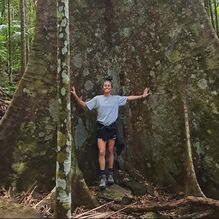Halle Martineau

Position: Visiting Masters Student-Industry Placement
Education:
• 2019-2020 Master of Science Major in Marine Biology, James Cook University, Townsville, Australia
• 2011-2016 Bachelor of Science Major in Marine Science, Florida Gulf Coast University, Fort Myers, Florida
Research Interest: coral reef ecology, ectoparasitic gnathiids
Placement Projects:
My Masters Industry Placement at The University of Queensland under Dr. Lexa Grutter comprised a wide variety of projects, including measuring isopod swimming speeds, chemically processing sediment and algae samples from reefs surrounding Lizard Island, Great Barrier Reef, and video analysis of fish movements among those reefs.
In my first project, I used videos made by Dr. Grutter of gnathiids attacking objects, to create a video showing their attack behaviour. The moving objects reflect fish in the wild, and when the gnathiids are hungry they move from their home in the reef benthos and rapidly attack/attach to the passing reef fish to feed on their blood. I also measured the attack speeds of the gnathiids using the Tracker Video Analysis and Modeling Tool. The video is now published in an article in the International Journal of Parasitology, as is gnathiid attack speed (maximum 24.5 cm sec-1; https://doi.org/10.1016/j.ijpara.2020.03.014.
For my second project, I bleached sediment and algae from settlement tiles to obtain organic weight. The organic matter will be compared between experimental control reefs and reefs that have been maintained without cleaner fish for 15 years. Measuring this will help determine any indirect effect of the presence of cleaner fish on the benthic reef community, most likely via cleaners’ beneficial effect on herbivorous fish abundance.
My last project consisted of analysing videos recorded from GoPro video cameras placed on the ocean floor near the above-mentioned experimental reefs. The videos recorded any fish movements between reefs to determine which species move among reefs and which do not. And thus whether they can easily seek cleaning services elsewhere in the absence of cleaners.
Supervisors: Dr Alexandra Grutter
Education:
• 2019-2020 Master of Science Major in Marine Biology, James Cook University, Townsville, Australia
• 2011-2016 Bachelor of Science Major in Marine Science, Florida Gulf Coast University, Fort Myers, Florida
Research Interest: coral reef ecology, ectoparasitic gnathiids
Placement Projects:
My Masters Industry Placement at The University of Queensland under Dr. Lexa Grutter comprised a wide variety of projects, including measuring isopod swimming speeds, chemically processing sediment and algae samples from reefs surrounding Lizard Island, Great Barrier Reef, and video analysis of fish movements among those reefs.
In my first project, I used videos made by Dr. Grutter of gnathiids attacking objects, to create a video showing their attack behaviour. The moving objects reflect fish in the wild, and when the gnathiids are hungry they move from their home in the reef benthos and rapidly attack/attach to the passing reef fish to feed on their blood. I also measured the attack speeds of the gnathiids using the Tracker Video Analysis and Modeling Tool. The video is now published in an article in the International Journal of Parasitology, as is gnathiid attack speed (maximum 24.5 cm sec-1; https://doi.org/10.1016/j.ijpara.2020.03.014.
For my second project, I bleached sediment and algae from settlement tiles to obtain organic weight. The organic matter will be compared between experimental control reefs and reefs that have been maintained without cleaner fish for 15 years. Measuring this will help determine any indirect effect of the presence of cleaner fish on the benthic reef community, most likely via cleaners’ beneficial effect on herbivorous fish abundance.
My last project consisted of analysing videos recorded from GoPro video cameras placed on the ocean floor near the above-mentioned experimental reefs. The videos recorded any fish movements between reefs to determine which species move among reefs and which do not. And thus whether they can easily seek cleaning services elsewhere in the absence of cleaners.
Supervisors: Dr Alexandra Grutter